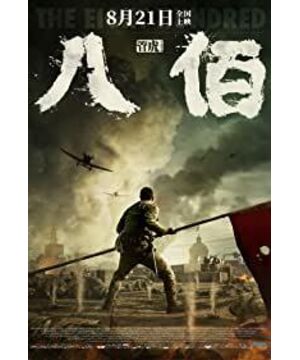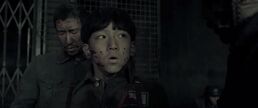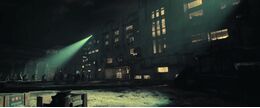In times of peace, it seems that the cruelty of war can never be imagined. For me, the deeds of the Eight Hundred Heroes just stay in books and words. But the theater gave me a chance to experience up close how every living life disappears, how every blood and tears gush out.
"Eight Hundred" shows the audience the history of fighting alone for 4 days and nights through the eyes of the skirmishers absorbed by the defenders. At the end of the Battle of Songhu in October 1937, as Shanghai's last stronghold - Sixing Warehouse, the last National Army - the 1st Battalion of the 524th Regiment of the 88th Division was stationed. There were 414 people in the battalion, but in order to confuse the enemy, they claimed 800 people. This is also the origin of the "Eight Hundred Heroes".
The so-called "800 men" were stationed on the last frontier of the Suzhou River. To the north, it is the occupied area where the land of China is devastated. As the last fortress in Shanghai and the real front line of the Anti-Japanese War at that time, the Sixing Warehouse attracted worldwide attention.
Through the huge contrast of life across the river, through the eyes of the stage, spectators, reporters, and international commentators, and through the words used by the special commissioner to convey the order to retreat, it conveys to us: this time, the mission of perseverance is more. In order for Chiang Kai-shek to win the sympathy of the international community at the meeting of the Nine Powers Pact, it is hoped that the international community can sanction the Japanese aggressors.
Undoubtedly, for politics, war seems to be nothing more than a stage play. The drama in the eyes of others may be trivial and may have nothing to do with oneself, but for those who are in the scene, every minute and every second is a breath and a life.
Compared with the soldiers who stood firm in the Sixing Warehouse, they were not spectators but actors. They are writing the next historical drama with their own lives and blood. Maybe when this drama ended, the traces of history did not record the names of each of them. The people who jumped downstairs to make body bombs with explosive packs on their backs only left a cry of their names, but they were wholehearted. Do your best to accomplish your mission.
One of the most important characters in the film is Zhao Zilong. Whether it's a real-life performance on the stage or a shadow puppet treasured among the soldiers, as a well-known figure of the God of War in the Chinese nation, the situation faced by the Eight Hundred Heroes is exactly the same as that of the former Zhao Zilong. Zhao Zilong once braved an army of 100,000 alone and was like a god of war. Inspired by this spiritual totem, everyone has the determination to die, but shows the courage of a lone hero.
Xiaohubei looked at the stage on the other side of the Suzhou River, and a high place appeared in his mind as he babbled. Above the high ground is a strong and dashing figure, riding a white horse and valiantly facing the 100,000 enemy troops. The man never turned his head. But after his elder brother sacrificed heroically, Zhao Zilong in Xiaohubei's heart became like his elder brother. He looked at the world with incomparable heroic spirit, and rushed towards the enemy army with a smile. Because of this, Xiaohubei finally became the youngest member of the death squad.
Although separated by a river, this end looked at the other, and the other looked at this, but they were not staring at each other coldly. From the very beginning, the people in the British and French Concessions seemed to have an attitude of nothing to do with themselves. They felt that fighting a war was a matter of being a soldier, and the fire of war would not burn here; ; Casinos, dance halls and other entertainment venues are open for business as usual, etc. But as the battle continued to escalate, the people in the concession gradually stopped "watching the fire from the other side of the river". Instead, they were doing their best to support the soldiers on the other side of the river. Journalists are no longer just a state of work, but to experience this battle from the perception of a human life.
Several soldiers in the Four Elements Warehouse are changing, from greed for life and fear of death to heroic sacrifice, from timid and fearful to righteous and awe-inspiring. Their transformation is because they saw more people sacrificed for this, and they also felt the last soul of the nation. The people in the concession are also changing. The gangster watching the casino can die tragically on the bridge to pass the telephone line. The casino operator takes out the flag and morphine representing the Republic of China. The professor who observes with binoculars all day can’t help but shoot. Wait, at the end of this battle, what has changed is everyone's attitude towards the invaders.
The final retreat can be said to be a tactical retreat, it can be said to preserve the fire, and it can be said to wake up the people. Live one is one. Every life is extremely valuable. In these 4 days and 4 nights of battle, what all the heroic spirits sacrificed can do is to show the spirit of our Chinese army to the international community, the Chinese people, and the white surnames on the other side. We are defending our territory, we are defending our sovereignty, we are defending the honor and dignity of our country with our lives.
This inspiration and spirit achieved a great fusion of military and civilians in the final bridge-crossing stage. No matter how strong the blockade and ammunition of the Japanese army were, they could not stop the awakening of the Chinese. As ordinary people, the idea that the war is far away from me has gone away. If there is no close support and defense of the people around them, without such a real sacrifice, they may die in their dreams.
The last resistance of the eight hundred warriors awakened everyone in the war: war is not only the task of the soldiers, but the life and death of the whole people. This is the final awakening of the Chinese nation!
Friday, August 14, 2020 19:13
View more about The Eight Hundred reviews










